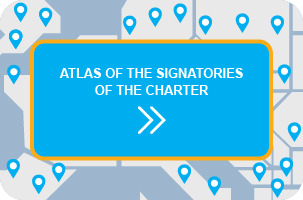Political role
Article 2 – Political Representation
1. The Signatory recognizes the equal rights of women and men to vote, to be a candidate for and to hold elected office.
2. The Signatory recognises the equal rights of women and men to participate in the formulation and implementation of policy, to hold public office and to perform all public functions at all levels of government.
3. The Signatory recognizes the principle of balanced representation on all elected and public decision making bodies.
4. The Signatory commits itself to take all reasonable measures in support of the above rights and principle, including:
- to encourage women to register to vote, to exercise their individual voting rights and to be a candidate for public office
- to encourage political parties and groups to adopt and implement the principle of balanced representation of women and men
- to this end, to encourage the political parties and groups to take all lawful steps, including by adopting quotas where deemed appropriate, to increase the number of women selected as candidates and thereafter elected
- to regulate its own procedures and standards of conduct, so that potential candidates and elected representatives are not discouraged by stereotypical forms of behaviour and language, or by harassment
- to adopt measures to enable elected representatives to reconcile their private, work and public life, for example by ensuring that timetables, working methods and availability of dependent care allow all elected representatives to participate fully.
5. The Signatory commits itself to promote and apply the principle of balanced representation to its own decision-making and consultative bodies, and in its appointments to external bodies.
However, where the authority does not currently enjoy a balanced representation of women and men, it will implement the above on a basis no less favourable to the minority gender than its current gender balance.
6. It furthermore commits itself to ensure that no public or political post to which it appoints or elects a representative is, in principle or in practice, restricted to or seen as the normal role of one gender, due to stereotypical attitudes.
Article 3 – Participation in Political and Civic Life
1. The Signatory recognizes that the right of citizens to participate in the conduct of public affairs is a fundamental democratic principle, and that women and men have the right to participate equally in the governance and public life of their region, municipality, and local community.
2. In relation to the different forms of public participation in its own affairs, for example via advisory committees, neighbourhood councils, eparticipation or participatory planning exercises, the Signatory commits itself to ensure that women and men are able to participate equally in practice. Where existing means of participation do not lead to such equality, it undertakes to develop and test new methods.
3. The Signatory undertakes to promote the active participation in its political and civic life of women and men from all sections of the community, in particular of women and men from minority groups who may otherwise be excluded.
Article 4 – The Public Commitment for Equality
1. The Signatory shall, as the democratic leader and representative for its community and territory, make a formal public commitment to the principle of equality of women and men in local life, including:
- the announcement of the signing of this Charter by the Signatory, following debate in and adoption by its highest representative body
- an undertaking to fulfil its commitments under this Charter, and to report publicly, on a regular basis, on progress in implementing its Equality Action Plan
- an undertaking that the Signatory, and its elected members, will adhere to and uphold good standards of behaviour, in relation to gender equality
2. The Signatory will use its democratic mandate to encourage other political and public institutions and private bodies, and civil society organisations, to take actions to ensure, in practice, the right to equality of women and men.
Article 5 – Working with partners to promote equality
1. The Signatory undertakes to co-operate with all of its partners, from the public and private sectors as well as the organisations of civil society, in order to promote greater equality of women and men in all aspects of life within its area. It will in particular seek to co-operate with its social partners to this end.
2. The Signatory will consult with its partner bodies and organisations, including its social partners, in developing and reviewing its Equality Action Plans, and on other major issues related to equality.
Article 6 – Countering Stereotypes
1. The Signatory commits itself to counter and, so far as possible, prevent prejudices, practices and use of language and images which are based on the idea of the superiority or inferiority of either of the sexes, or on stereotyped roles for women and men.
2. To this end, the Signatory will ensure that its own public and internal communications are fully in accordance with this commitment, and that they promote positive gender images and examples.
3. The Signatory will also help its staff, by training and other means, to identify and eliminate stereotypical attitudes and behaviour, and will also regulate standards of behaviour in this regard.
4. The Signatory will conduct activities and campaigns to raise awareness of the detrimental role played by gender stereotypes to the achievement of equality of women and men.
Article 7 – Good Administration and Consultation
1. The Signatory recognizes the right of women and men to have their affairs handled equally, impartially, fairly and within a reasonable time, including:
- The right to be heard before any individual decision which might affect them adversely is taken
- The duty of the authority to give reasons for its decisions
- The right to relevant information on matters affecting them.
2. The Signatory recognizes that, across the range of its competences, the quality of its policies and decision making are likely to be enhanced if all those who may be affected have an opportunity, at a formative stage, to be consulted, and that it is essential that women and men are given in practice equal access to relevant information, and equal opportunity to respond.
3. The Signatory therefore commits itself to take the following steps as appropriate:
- Ensuring that arrangements for providing information take into account the needs of women and men, including their respective access to information and communication technologies
- Ensuring that where consultation takes place, those whose views are otherwise least likely to be heard are able to participate equally in the consultation process, and that lawful positive actions are taken to ensure that this happens
- Conducting, where appropriate, separate consultation activities for women.









